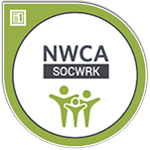PURPOSE
The Social Work Professional credential is designed to document the essential competencies required for those assisting in the social work profession or those in professions that rely on social service skills. Core social work knowledge focuses on understanding the common issues faced by different populations, the primary activities performed by social work professionals to resolve these issues, and a clear understanding of the groups served by social services.
AUDIENCE
This credential is appropriate for social service professionals and assistants working in social work settings such as schools, community centers, nursing homes, health clinics, correctional facilities, military bases, hospitals, and universities. It is also appropriate for those working in professions that provide social services for issues such as unemployment, substance abuse, mental illness, domestic violence, and child abuse. Professionals outside of social work that may benefit from this credential include community health workers, public policy makers, community advocates, home health workers, health educators, probation and correctional officers, social service managers, school counselors, and hospital workers.
JOB/CAREER REQUIREMENTS
The Social Work Professional credentials document competencies needed to perform effective social service practices that result in the empowerment of individuals and groups that are marginalized, and the promotion of social justice for all individuals. To accomplish this, professionals must understand the role of a generalist social worker in society, the historical milestones that have shaped the social work profession, the values and ethical principles that guide social work, the issues facing social workers, the activities and practices of social workers, and the unique populations that social workers interact with.
SOCIAL WORK WORKPLACE TASKS:
- Identify those in need of assistance
- Assess clients’ needs, their situations, their strengths, and support networks to determine their goals
- Develop plans to improve clients’ well-being
- Help clients adjust to life changes and challenges such as illness, divorce, or unemployment
- Refer clients to community resources to meet specific needs
- Help clients work with government agencies to apply for and receive benefits available
- Respond to clients in crisis situations
- Follow-up with clients on their current situations and check for improvements
- Develop and manage the social services provided to individuals and communities
- Evaluate the social services provided to clients in order to ensure the services were successful
- Advocate for social justice of individuals, communities, and society
EXAM STRUCTURE OVERVIEW
Number of Questions in Exam: 70
Total Time: 60 minutes
Overall Passing Score: 70%
(All sections require an individual passing score of 70%)

